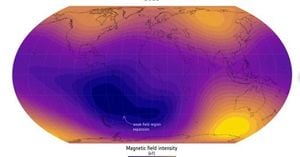Across Germany, the air quality has plummeted to alarming levels due to elevated concentrations of fine dust, primarily PM2.5, sparking concerns among health experts and environmental agencies.
According to reports from dpa/tmn, the Umweltbundesamt (UBA), Germany’s Environmental Federal Agency, has issued warnings about the current status of the air quality, labeling it as "außergewöhnlich schlecht" (exceptionally poor). Regions including Niedersachsen, Bremen, Hamburg, and parts of Brandenburg, Berlin, and Bavaria are experiencing severe pollution, causing myriad health issues.
Ute Dauert, head of assessment for air quality at UBA, emphasized the risks for vulnerable populations. "Bei schlechter Luftqualität sollten empfindliche Menschen körperliche Anstrengungen im Freien vermeiden" (Sensitive individuals should avoid physical exertion outdoors when air quality is poor), she advised. This is largely due to the potential for fine dust particles to enter the lungs and bloodstreams, exacerbated by conditions such as asthma and respiratory diseases.
The rise in fine dust levels is attributed to multiple sources, including heavy traffic, emissions from heating, and industrial activities. Winter presents unique challenges, as colder temperatures lead to increased heating demands, often relying on wood-burning systems which contribute to air pollution. Further complicate this issue is Germany’s past reliance on coal-based energy, which environmental advocacy groups like WWF Germany are urging to phase out. "Die gesundheitsgefährdende Luftverschmutzung der letzten Tage ist auch eine direkte Folge unserer veralteten, fossilen Energieversorgung" (The health-threatening air pollution of recent days is also a direct consequence of our outdated fossil fuel energy supply), states Sebastian Breer, climate expert at WWF Germany.
The weather has also played a significant role, with meteorological conditions leading to stagnation of the air. High-pressure systems limit the vertical mixing of air, effectively trapping pollutants like fine dust at lower levels, and making matters worse. UBA explains: "Diese Schadstoffe sind quasi in den unteren Luftschichten 'gefangen'" (These pollutants are effectively trapped in the lower layers of the atmosphere).
Berlin has faced particularly high PM2.5 readings, with measurements ranging from 26 to 39 micrograms per cubic meter as reported by local environmental monitoring stations. For comparison, readings above 25 micrograms are classified as "schlecht" (poor) and can prompt warnings against outdoor activities. The situation is dire enough to recommend less strenuous activities, with UBA noting, "Besser ist ein gemütlicher Spaziergang, als zu joggen" (A leisurely walk is preferable to jogging).
Forecasts suggest the situation may improve soon. A low-pressure system named "Max" is expected to sweep across Germany soon, bringing precipitation and winds to help disperse trapped pollutants. "Das Tief 'Max' wird bis Donnerstag hierzulande verbreitet für Regen- und Schneefälle sorgen, welche den Feinstaub auswaschen" (The low-pressure 'Max' will bring widespread rain and snow by Thursday, helping to wash out fine dust), noted rbb24. This shift should provide some relief to the affected urban areas, which have been struggling under continuous poor air quality.
This issue highlights the necessity for change not only at individual levels but also through national energy policies aimed at reducing emissions contributing to the air quality crisis. Urgent action is required to transition away from traditional fossil fuels toward more sustainable options to mitigate both the short-term health impacts of fine dust and long-term environmental consequences.



